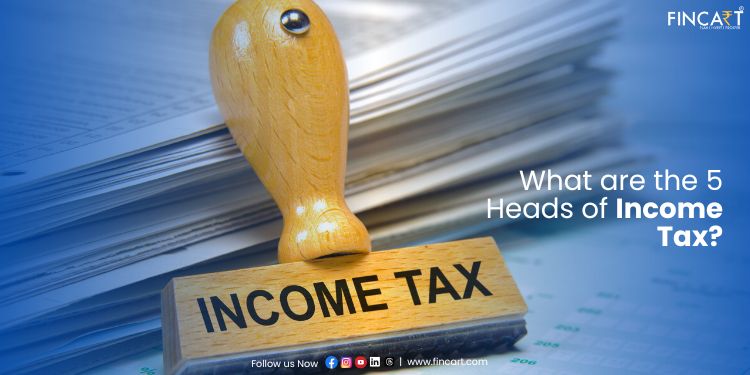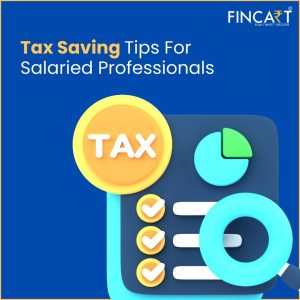Table of Contents
ToggleWhen you have to do your taxes at the end of the year, you have to classify the income you have earned in the financial year into five categories. These categories are listed in Section 14 of the Income Tax Act of 1961.
Since people have different sources of income, it can be confusing sometimes to tell which of the earnings in a particular financial year will fall under which category. To correctly classify your earnings, you need to have a clear understanding of each of the five income tax heads, and in this blog, we will do just that! We’ll break down each head individually to make things easier for you and help you make informed decisions about your finances so that you can engage in effective tax planning.
Five Heads of Income
The 5 heads of income tax are mentioned below:
- Income from salary
- Income from house property
- Income from profits and gains from business or profession
- Income from capital gains
- Income from other sources
1. Income from salary
The first head of income is the income from salary. The majority of us derive our primary income from salaries. If an employer gives you, an employee, monetary compensation, your income is classified under this head. Our salary is the fruit of our labour, but how is it categorised as far as income tax goes? Well, there are several components within this head, such as
-
- Your basic wages
- Pension
- Perquisites
- Gratuity
- Commission
- Any bonuses such as an annual bonus
- Leave encashment
- Advance salary, and others.
When all such components are added, you get your gross salary, and this gross amount is what is charged under the income from the salary head.
Some of the components of your salary are exempt from taxes under the Income Tax Act, such as
-
- House Rent Allowance, which an employee gets in a standard package and is used to pay the house rent. Exemptions for HRA are listed under Section 10 of the Income Tax Act.
- Conveyance Allowance, which an employee receives for travel between the office and home. This exemption is also listed in Section 10 of the Income Tax Act, and one can claim a maximum exemption of Rs. 1,600 per month.
- Leave Travel Allowance, which is the compensation an employee receives for personal travel, such as for vacations. Under Section 10(5) one can claim LTA tax benefits for two trips in four years.
- Medical allowance, which is received by employees to cover their medical expenses. Under Section 17 of the Income Tax Act, one can claim up to Rs. 15,000 as tax exemption per year.
If you are an investor who is looking for a tax-saving investment option, you should consider Equity-Linked Savings Scheme mutual funds. Understanding the ELSS mutual fund meaning can help you optimise your tax liabilities. These funds have potentially high returns as they invest in equities or equity-related instruments, and under Section 80C they also provide tax benefits. This dual benefit, coupled with the fact that ELSS has the shortest lock-in period compared to other tax saving options at three years is why ELSS is a popular pick among people looking to minimise their tax liabilities.
2. Income from house property
Income from house property is the next head of income tax. This head is outlined in Section 22 to Section 27 of the Income Tax Act and offers a comprehensive view of the earnings associated with a property. Income from house property goes beyond what you earn in rent – it’s a calculated amount that includes what you could have earned.
The primary source of income in this category is the rental income received by the property owner. This includes the rent paid by tenants for the use of the property. In cases where a property is not let out but has the potential to generate rental income, or if all the properties are self-occupied, the tax still has to be paid on the value of rent the taxpayer would have received in case they had rented the property.
There are a few conditions for income to be taxable under this head:
-
- The house property has to be owned by the taxpayer.
- The house property has to be a building, house, or land appurtenant.
- The house property cannot be used for any other purpose other than residency.
Many deductions are allowed under this head. Property owners can deduct the municipal taxes paid during the fiscal year. A standard deduction is allowed to account for various expenses related to the maintenance and upkeep of the property. Owners are also allowed deductions on payment of home loan interests.
3. Income from profits and gains from business or profession
The third head of income is income from profits and gains from business or profession. If you make your money through business or are self-employed, you have to classify your income under this head. Business means any kind of trade or manufacturing, and profession means you have acquired your skills in a specific field after studying and passing related examinations. Since the tax is levied on gains, you have to subtract your expenses from your total revenue to get a gross amount. This gross amount is what is taxed.
Some rules under Section 28 of the Income Tax Act have to be satisfied for income to be charged under this head:
- The business or profession that you declare has to be legitimate.
- As the taxpayer, you have to carry out the operations of the business or profession.
- For the majority of the previous year, the taxpayer has to be actively controlling the business or profession.
- The tax is charged on the gains made by the business or profession when it was operating in the previous year.
- The taxpayer has to list all other businesses or any other professions that they are carrying out.
Under this head, some of the kinds of income that can be charged include:
-
- All profit an organisation makes on income.
- Gains you receive due to partnership with another firm.
- Any benefits that your business receives.
- Profit made by the sale of certain licences.
- Bonuses and incentives received.
- Sale of imports.
- Commissions.
Remember that your business or profession doesn’t have to be operational for the entirety of the previous year to be charged under the head. If it was active at any time in the previous year, tax can be charged.
4. Income from capital gains
When you invest in a capital asset and make a profit upon selling it, that profit becomes taxable and it is classified under the head of income from capital gains. Some of the capital assets include stocks, real estate, gold, bonds, and mutual funds.
There are two types of gains one can make on capital assets – short-term capital gains and long-term capital gains. Short-term capital gains are gains you make when you sell your capital assets within three years or 36 months. Depending on the asset, a maximum of 15% tax can be applied to these gains.
On the other hand, long-term capital gains are made after you sell an asset you’ve invested in for over three years. The rate of tax on these gains is applied up to a maximum of 20%. This is why when you’re investing, it’s important to consider the holding period of the asset, as it has tax implications later.
Under Section 54 and Section 54F of the Income Tax Act, there are various exemptions available for capital gains.
5. Income from other sources
The fifth and final head of income is a catch-all category. It includes earnings from various sources that are not covered under the previous four heads. This head falls under Section 56 (2) of the Income Tax Act and includes the following sources of income:
-
- Lotteries,
- Interest income on savings accounts,
- Gambling rewards such as card games,
- Sports rewards,
- Gift cards,
- Royalties,
- Any amount exceeding Rs. 50,000 received from someone who is not your relative, and many other sources.
Given the complexity and diversity of income sources falling under this category, it could be smart to consult a tax advisor to minimise your liabilities. An experienced tax advisor can guide you on proper classification and help you make sure you don’t miss out on potential deductions and benefits.
Don’t fall behind your taxes!
Get in touch with Fincart to handle your taxes and optimize your savings.
Differences between heads of income tax & sources of income
The terms “heads of income” and “sources of income” are often used in the context of taxation and accounting, and they refer to different aspects. Here are the key differences between the two:
Parameters |
Heads of Income |
Sources of Income |
|
Definition |
Heads of income represent broad categories or classifications under which various types of income are grouped for tax purposes. |
Sources of income refer to the specific origins or channels through which an individual or entity earns income. |
|
Purpose |
The classification of income into different heads helps in determining the applicable tax rules and rates for each type of income. |
Identifying sources of income helps in understanding the nature and variety of income-generating activities. |
|
Example |
· Income from house or property · Capital gains · Income from salaries · Gains and profits from profession or business · Income from capital gains |
For individuals, · Salary · Interest · Commission
In case of businesses, · Returns on investments · Profits · Grants from the government and more |
Conclusion:
Albert Einstein once said, “The hardest thing in the world to understand is income tax.” Of course, he was exaggerating and said so in jest, but there is some truth behind his statement. Income tax laws can be quite complex but with the right knowledge and approach, tax can become a manageable aspect of our lives. You now know all about the different heads of income so you can easily classify your income when filing for your tax.
Remember though that accurately calculating tax is an entirely different thing, so if you have any confusion, you can seek the help of an income tax planner. Not only can an income tax planner help you avoid unnecessary penalties, but can also enable you to take advantage of the various exemptions, deductions, and benefits and guide you through the ever-changing landscape of tax laws.
FAQ
What is the meaning of Income?
Income, in the context of income tax, refers to money earned or received from various sources such as salaries, wages, business profits, rents, dividends, etc. It is broadly categorized into five heads for taxation purposes.
What is the meaning of Taxable Income?
Taxable income is the portion of total income that is subject to income tax after allowing for deductions and exemptions as per the provisions of the Income Tax Act. It is calculated by subtracting deductions (such as under Sections 80C to 80U) from gross total income.
What is Section 5 of the Income Tax Act?
Section 5 of the Income Tax Act, 1961, defines the scope of total income for taxation purposes in India. It outlines what constitutes income in hands of taxpayers based on their residential status, distinguishing between income that is taxable and income that is not taxable.
What is the difference between heads of income and sources of income?
Heads of Income: These are broad categories under which income is classified for the purpose of computation and taxation (e.g., salaries, house property, business or profession, capital gains, other sources).
Sources of Income: These are specific origins from which income is derived within each head (e.g., salary received from an employer, rental income from a house property, dividend income, interest received, etc.).
Can I claim a deduction of expenses incurred to earn Income from Other Sources?
Yes, expenses incurred to earn income under the head ‘Income from Other Sources’ are deductible. These could include expenses directly related to earning that income, subject to specific conditions and limits under the Income Tax Act.
What are the 5 heads of Income?
The five heads of income under the Income Tax Act are:
- Income from Salaries
- Income from House Property
- Profits and Gains of Business or Profession
- Capital Gains
- Income from Other Sources
Which income falls under the head ‘Income from Salaries’?
Income from Salaries includes any compensation received by an employee from an employer, including basic salary, allowances, bonuses, commissions, perquisites, etc.
Which incomes are considered as ‘Income from House Property’?
Income from House Property includes rental income earned from letting out a property, whether it is residential or commercial. Even if a property is not rented out but is capable of generating rental income, it is considered under this head, potentially leading to a notional rent being taxed. Deductions such as municipal taxes paid and a standard deduction of 30% for maintenance are allowable against this income.
Which incomes are covered under the head ‘Income from Capital Gains’?
‘Income from Capital Gains’ includes profits or gains arising from the transfer of capital assets such as land, building, securities (like shares and mutual funds), jewelry, etc. It is categorized into short-term capital gains (STCG) and long-term capital gains (LTCG) based on the holding period of the asset.
What is the deduction available under HRA under the salary heads of income tax?
The House Rent Allowance (HRA) is an allowance provided by employers to employees to meet rental expenses. The deduction for HRA is available under Section 10(13A) of the Income Tax Act, subject to certain conditions. The least of the following is deductible:
- Actual HRA received
- 50% of salary (for metro cities) or 40% of salary (for non-metro cities)
- Rent paid minus 10% of salary
How are losses adjusted between the 5 heads of income?
Losses can be adjusted by setting them off against income under the same or different heads, with specific rules, such as business losses being carried forward or capital losses set off only against capital gains.
How is income from salary calculated under the 5 heads of income?
Income from salary includes basic salary, allowances, perquisites, and bonuses, reduced by exempt components like HRA, standard deduction, and professional tax to arrive at the taxable salary income.
How are dividend income and interest income taxed?
Dividend income is taxed under Income from Other Sources, with specific exemptions for dividends from domestic companies, while interest income from bank deposits or bonds is fully taxable at the applicable slab rate, subject to certain deductions.
How do deductions and exemptions apply under the 5 heads of income?
Deductions and exemptions reduce taxable income, with exemptions specific to certain heads (like HRA in salary) and deductions under sections like 80C, 80D, and 24(b) applicable across different income heads.




